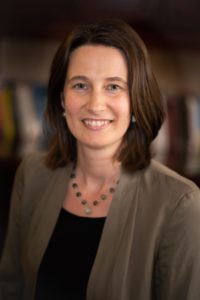
Tiffany Jones is an assistant professor in the School of Social Work. Learn more about why she came to CSU, and her interests in how evidence-based programs consider cultural and racial difference and the social justice implications of implementing these programs; the development of community-based research to practice partnerships; and etiological research on the social environment on behavioral health to inform intervention development.
1. What brought you to CSU’s School of Social Work?
The School of Social Work has been one of the most warm and welcoming environments I have ever worked in. The dedication of the staff and students to social justice is inspiring. I am thrilled to have found support and interest in my research areas here at CSU, and I am excited to work at a public, research focused, land grant university.
2. What are your research interests, and how did you get into that topic?
My research is focused on the etiology, prevention, and treatment of mental health and substance use problems, and the promotion of well being and academic achievement in youth and across the life course. Specifically, I am interested in deepening our knowledge of how evidence-based prevention and treatment programs (EBP) consider cultural and racial difference, and the impact of EBPs on racial equity.
I focus primarily on building community and school partnerships and how schools and youth development programs can use data to improve their practices to promote racial equity, especially at the systems level. The ultimate aim of my research is to interrupt the school to prison pipeline and bring educational justice to students of color. To do this, I think we need to start to unpack our implicit assumptions of colorblindness, and how it is baked into the systems that young people interact with.
I came to this area of research after working in community mental health with youth and their families and severely mentally ill adults in Los Angeles for many years. I was trained as an MFT and Art Therapist, and was searching for ways to understand how systems of oppression were impacting the people I was working with. This search brought me to Social Work.
Part of my job as a therapist was to implement evidence based practices; I noticed that most programs hadn’t considered culture in the way that illness and healing were conceptualized. This not only seemed like a big blind spot on the part of many interventions since culture has such a large influence on how we see the world and what the path to healing and wellness might look like. But it is also a social justice issue, as the values of the dominant culture are inherently understood as the “norm,” potentially ignoring the cultural capital of the community.
My experience as a therapist taught me about the gap between research and practice, as I lived it in the difficulty of implementing EBPs. I learned about the importance of partnership with the folks whose communities are impacted and the folks who are doing the work on the ground. As a result, community based research and research-practice partnerships form the foundation for the majority of my research.
3. What’s your teaching philosophy?
To me, the most important thing for students to learn in social work classes is how to internalize a social justice compass, and see how they can enact the change they want to see in the world from their interpersonal relationships and interactions, to how they approach the organizations they will eventually work in, to their aspirations for systems and policy change.
My approach as an instructor is to use the classroom as a crucible to collaborate with each other and to creatively problem solve how to bring a social justice lens to problems of practice.
 4. What’s your favorite thing about campus so far?
4. What’s your favorite thing about campus so far?
I love the energy of the campus, there is always so much going on. I love biking everywhere, and the on-campus climbing wall!
The School of Social Work is part of CSU’s College of Health and Human Sciences.